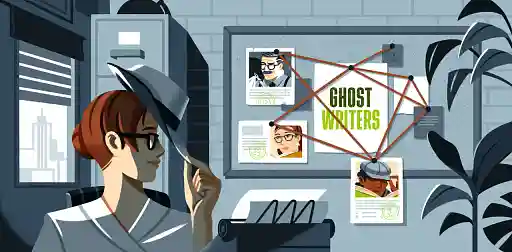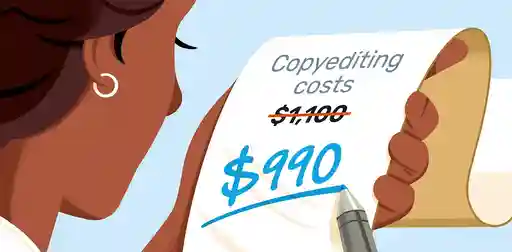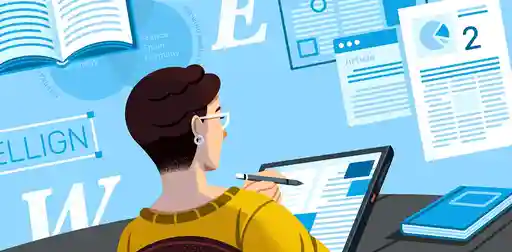
Reedsy's editorial team is a diverse group of industry experts devoted to helping authors write and publish beautiful books.
Head of Content at Reedsy, Martin has spent over eight years helping writers turn their ambitions into reality. As a voice in the indie publishing space, he has written for a number of outlets and spoken at conferences, including the 2024 Writers Summit at the London Book Fair.
Becoming a published author is a dream shared by almost every writer. Unfortunately, there are plenty of unreliable companies out there looking to make a quick buck by exploiting those dreams.
To help you protect your work, your bank account, and your dignity, we're going to highlight some of the shady companies you should avoid — and give you tips on how to spot a publishing scam at ten paces.
The trouble with many dodgy publishing companies is that what they offer isn't usually illegal. They do, however, all manage to find a way to dangle something irresistible in front of authors, making them ignore the voice of caution in the back of their minds.
Who wouldn’t love it if a publisher offered to reprint one of your self-published titles or publish your next book, right? You might even be happy to pay some fees to get the ball rolling on the production process.
But that would be a big mistake. No legitimate traditional publisher would ask you to foot the bill. In fact, when acquiring your book, they will pay you an advance. If a publisher asks you to pay for publication, it's likely a vanity press.
Some massively prolific vanity presses you may wish to avoid include:
Some scammers even masquerade as Big Five imprints. In the early months of the COVID-19 pandemic, they started targeting desperate authors with a “publishing package” that cost exactly the same as that received by US citizens in their federal stimulus checks.
These days, it isn’t enough to simply learn the names of unreliable publishers. New vanity presses seem to set up shop each month — and with no “bad press” associated with their names, they’re able to convince many authors to pay for their services. To understand why publishing with a vanity press is a terrible idea, head on over to this post, which discusses the dangers of “paying to publish.”
If you want to work with reliable publishers, browse our catalog of independent presses, all of which have been thoroughly vetted. Sometimes, vanity presses call themselves hybrid publishers, so head to our post on hybrid publishing to better understand that model.
Pro-tip: Wondering whether to self-publish or traditionally publish? Take this free 10-day course to understand your choices.
Another kind of scam you might be dealing with is an agent scam. If a literary agent unsolicitedly contacts you to offer you a book deal with a publisher or asks you to pay a reading fee, your spidey sense should be tingling pretty hard.
Firstly, literary agents won’t ever contact you directly — unless you’re already a wildly successful author (and even then, most reputable agents would avoid poaching you from your current representation). If you belong to the 99% of authors who’ve yet to achieve major success, the only way to get an agent to represent you and your book is to send them a query letter.
Even if they help you polish your manuscript before submitting it to publishers, an agent should not charge you. They work on commission, and the only time you should pay them is when they’ve successfully helped sell your story to a publisher.
When it comes to agents, it’s best to stick to vetted lists like that of the Association of Author Representatives or our directory of almost 700 literary agents.
Are you suspicious of a certain company? Take this short quiz, which will help you sniff out a predatory business.
Take this quick quiz to see if you're dealing with a legit publishing company.
Though self-publishing, by definition, means that you’re doing it yourself, there are companies out there who can give you a hand. In fact, it’s advisable to get editing and designing services from reliable professionals to make sure your book is of top quality.
However, if you don’t have your guard up, it is easy to fall for predators who simply want to overcharge for their services — many of which are tasks you could accomplish on your own. Here are some such ‘services’ to avoid.
Editors and designers are essential to a book’s success — and some companies and individuals will exploit this fact to take money out of your pocket. The worst thing is that they may even quote reasonable costs for self-publishing services, leaving you unsuspecting at first and then end up delivering low-quality work.
When it comes to cover designers and illustrators, it can be easier to tell who’s actually a pro — since their artwork is clearly visible. However, with editors and book coaches whose work is invisible to the reader (if they’ve done their job right), you have to do some research before signing a contract with them. Or… you can search for professionals on Reedsy.
At Reedsy, we vet each professional by verifying their professional experience, ensuring that every freelancer on our platform either has a wealth of traditional publishing experience or is a seasoned and well-reviewed collaborator on indie books. To learn more about how Reedsy chooses its professionals, read our selection criteria here.
The acronym may make it sound more complicated than it is, but getting an International Standard Book Number (ISBN) is not like joining the Illuminati: you don’t need a special introduction or to be someone’s important grandchild. For $125, any author can buy an ISBN through Bowker in the USA or Nielsen in the UK: agencies that issue ISBNs and cannot profit from their sale.
However, plenty of companies will make a big deal of securing you an ISBN and charge you hundreds of dollars on top of the actual cost when you could just spend 10 minutes on Bowker and do it yourself.
To be honest, most online retailers for indie authors will supply their own identification codes these days. If you’re not planning to distribute to brick-and-mortar stores, you’ll probably be fine without an ISBN. But if you simply must have one, check out our guide on how to get one without paying more than you need to.

Did you know that if you don’t register the copyright of your book, literally anybody could claim it as their work and profit from it?
Now, that’s entirely false, but you’d be surprised how many people believe it. Authors own the copyright to their works before and after they publish them. In the US, registering that copyright simply provides a few statutory rights when it comes to claiming damages — and it should only cost you $45 to apply for it online (as of February 2022). For more details on how to register your copyright, you can check out this comprehensive guide.
Selling a book is something that most authors struggle with. (For a primer on the topic, check out this guide.) So it’s no surprise that there are people who will offer to solve your marketing problems for a low, low fee. Let’s dig into some of the miraculous “marketing solutions” that authors are often sold:
Press Releases. Whenever a company has a big new “story” to promote, it will issue a press release and publish it on sites where the media can pick it up. Scam companies will sell you on the idea that the New York Times, Good Morning America, and Newsweek can pick up on your story, but the chances of that actually happening are very slim.
Book Fairs. Every year, the publishing world flock to a handful of book fairs where the rights to publish new titles are snapped up. The big ones are in London and Frankfurt (and Bologna for children’s books), and almost anyone can book a table at these events. Predatory companies will offer to display your book at one of these fairs for a fee. More often than not, yours will be one of the countless books on a table in some unseen corner of the convention floor.
Screenplay adaptations/coverage. Certain publishing companies will offer to write up a “coverage” package to make it easier to sell your book to Hollywood production companies. Others will even get an anonymous screenwriter to adapt it into a Netflix pilot. There’s never been any evidence of successful pitches, but these services will surely cost you a pretty penny.
If you need someone to help you market your book, make sure they offer services that directly impact your ability to reach your target reader (digital advertising and mailing list growth). Avoid companies that offer grand (yet vague) promises of instant stardom.
Writing contests are a great way to reach an audience, solidify your writing credentials, and even make a little money in the form of prizes. There are, however, competitions that are little more than money-spinning enterprises. And you can usually sniff them out by the fact that their prizes are not really prizes.

Some contests publish winning entries in a magazine or anthology, which is great. But sometimes, “winning” authors are obliged to pay an “editing fee” for that privilege, which is not great.
Some competitions also award trophies. The catch is that the author is expected to pay for the cost of the physical prize. This isn’t necessarily bad—unless you mind paying $80 for a slab of acrylic. Dozens more have also “won” that month.
In short, read the fine print. To find contests that have been vetted, you can look through this directory of the best writing competitions.
And that covers most of the publishing companies you want to steer clear of in your career as an author.

Now that we’ve learned who the scammers are and how their business operates, it’s time to discuss all the things you can do to turn predators away when they come sniffing at your door.
You can take the quiz below to get a quick verdict on whether you’re dealing with a publishing scam, and then read on for more details on how you can do the detective work yourself.
Take this quick quiz to see if you're dealing with a legit publishing company.
It can flatter you quite a bit if someone contacts you out of the blue and offers to realize your publishing dreams. But don’t let the joy of that offer distract you from the truth—that legitimate traditional publishing companies hardly ever contact you first.
If you want to publish traditionally, you have to query agents and submit to publishers. However, there are more authors looking to get published than there are agents and editors to take them on, meaning professionals are often too busy reviewing submissions to contact you. The only people they might reach out to are well-known chart-topping authors.
So if someone you haven’t contacted appears in your inbox, offering to make a bestseller out of your book, alarm bells should be ringing.

If you read our guide on vanity presses, you’ll know that traditional publishing works as follows:
Similarly, literary agents don’t ask you to pay anything. They represent you and will only make money once they sell your book to a publisher. There are no reading fees, editing fees, or legal fees to be paid before the book is sold.
Because of that, any traditional-style publishing company that asks for payment from you is a vanity press at best — and a publishing scam at worst.
In self-publishing, on the other hand, you pay editors, designers, marketers, and printers. But they don’t publish your book; they provide specific services that help you do the publishing.
When it doubt, Google! There is hardly a handier tool than this to verify a company's legitimacy. You can pop the name of the company in question into the search engine and see what comes up.
If the company doesn’t have an official website, you should be suspicious. If there is a website but it looks like it hasn’t been updated since 2005, red flags should be flying.
While you're on the internet, check out Writer Beware, a blog with up-to-date news about publishing scams of all kinds. In the sidebar of the site is a blacklist of companies that have been identified as predatory — if the company you're dealing with appears in this list, it’s a clear no-go.
Examining the books the company claims to have worked on is also a good strategy. Nowadays, most books are sold on Amazon, so it’s a reliable place to do your research. Alternatively, you can go to Goodreads.
Once you’ve found the books, you want to make sure that each has:
Take some time to check the reviewers. If you see names of other authors who have worked with this publishing company, it’s a sign that the company is unreliable. They may have asked their authors to leave reviews on one another’s books to give each a legitimate appearance since there aren’t any real readers.
If you’re still unsure about the company, why not ask fellow writers who have published before? Go to relevant forums and boards and start a discussion. Ask some questions and see if any other author has been through a similar situation. Sometimes, you may even stumble across incriminating threads about writers’ experiences with scammers.
Just remember to find a well-established writer community with a good number of members so that you get as many perspectives on the matter as possible. Once you’ve found a good place, other writers will be happy to help where they can!
Another tactic is to ask the representative of the company you're dealing with a couple of questions. You can pick smaller details, like information on publishing costs, the target market, or distribution channels.
Not only do you want to see their answers, but you can also gauge plenty from their reaction. Seasoned scammers won’t bat an eyelid, but they will try to fluster you — they will amp up the time pressure, urging you to take the deal before it's too late. They will try to panic you rather than answer your question.
After all this research, if you still feel even the slightest bit unsure about this business's reliability, it’s best to decline to work with them. Only work with people you are certain to have the right experiences, expertise, and care to strengthen your book.
Knowing how difficult it can be to find reliable partners in your publishing endeavors, the team at Reedsy has independently vetted over 3,000 publishing professionals before letting them list on our marketplace. You can sign up for free, browse these professionals’ profiles, and send them a request if you’re interested.

All editors, designers, and marketers on Reedsy have been vetted.
We hope this guide has helped you protect yourself on your publishing journey. Stay safe, avoid scammers, and we know you’ll find the right professionals for your book soon enough!
– Originally published on Aug 21, 2019
Recommended posts from the Reedsy Blog

While there are much better alternatives, here's how you can format a book in Google's popular writing app.

Learn which companies you can trust if you want to find a ghostwriter to write your next book.

If you want to publish your book without spending a single dime, check out this handy list of 7 free self-publishing services.

If you want to self-publish a book without breaking the bank, here are 5 tips to ensure you still get the best result possible.

A list of 30 of the best book dedications in the business that'll have you crying, laughing, and crying laughing.

Expository writing is a fundamental part of how we learn and make sense of the world. Learn all about it in this post.
Join a community of over 1 million authors
Reedsy is more than just a blog. Become a member today to discover how we can help you publish a beautiful book.